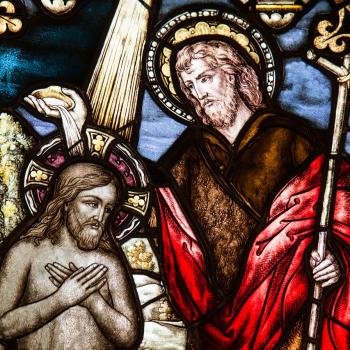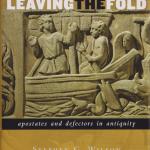There is one sin that is unpardonable according to Jesus—blaspheming the Holy Spirit. But under which circumstances is it committed according to Scripture? Let us look at the three biblical passages where the unpardonable sin appears:

Matthew 12:31–32
In Matthew 12:31-32 those who are in danger of blaspheming the Holy Spirit are Jesus’s unbelieving religious opponents. Important for our purposes, these opponents are not identified as Christ’s followers.
Matthew’s Gospel includes two separate incidents where the opponents claim that Jesus performs his miracles, exorcisms, by a demonic power (Matt 9:32–34; 12:24). The blaspheming thus has to do with their wrong evaluation of what the Spirit of God was accomplishing through Jesus. The opponents reject the definitive sign of God’s impending kingdom that brings forth prophetic words and deeds.
Moreover, the Spirit is related to divine healing and proclamation associated with the forgiveness of sins, and the opponents’ problem is one of unforgiveness—both of others and their own need to be forgiven. They could not, as James Williams affirms, comprehend “the true nature of God’s disposition toward and work in the world” (James G. Williams “Note on the ‘Unforgivable Sin’ Logion.” New Testament Studies 12 1965:75–77).*
Mark 3:28–29
Mark’s version attributes the unpardonable sin likewise to Jesus’ unbelieving opponents, the religious leaders. The accusation is that Jesus is demonized, perhaps suggesting a repetitive charge (Mark 3:22; 3:30). It is possible that the imperfect tense elegon (ἔλεγον) in these verses may imply that these opponents “kept on saying” Jesus performed exorcisms through the help of demonic power (see William Lane, Gospel of Mark, 136). But Mark uses the word and tense quite frequently: cp. e.g., Mark 2:16, 24; 3:21; 4:41; 5:31; 6:14–15; 6:35. Even so, Matthew uses the same tense in the parallel: Matt 9:34).
The result of persistent stubbornness exemplified by the escalating resistance towards Jesus’s message portrayed in Mark 2–3 functions as the ground for why divine hardening takes place in 4:10–12. Israel’s leaders at the time are seen as culprits in rejecting divine guidance. This condition in Mark’s Gospel results in spiritual hardening and blinding, a prevalent theme throughout (Mark 3:1–4:12/ Isa 1–6; Mark 7:1–13/Isa 29:13; Mark 12:1–12/Isa 5:1–7).
Prior resistance of these leaders towards Jesus and his miracles in Mark 2–3 fits well with the passage in which Jesus quotes Isaiah 6:9–10 in relation to those “outside” who do not comprehend his parables. Mark’s Gospel probably assumes that its audience will connect the dots between the outsiders’ spiritual blindness in Mark 4:10–12 and Jesus’s opponents who harden their heart in Mark 2–3 (e.g., 3:5–6).
Luke 12:10
Luke’s version of blaspheming the Holy Spirit is distinct from Matthew and Mark. This Gospel’s takes place in the context of persecution (Luke 12:10; cf. 12:4–9). Unlike the other Synoptic writers, Luke does not relate this sin to an accusation made by religious leaders that Jesus casts out devils by the power of Beelzebul (cf. Matt 12:22–32; Mark 3:19–30). That story is included in Luke 11:14–22 but without the warning related to their blaspheming the Spirit.
In Luke 12:4–12 Jesus’s addresses his warning to his disciples, who in the impending future will be brought before rulers and authorities. Acts lists numerous occasions in which the Christ-followers stand before such authorities (Acts 4:3–23; 5:17–40; 6:9–7:58; 16:19–36; 17:5–9; 18:12–17; 23:1–11; 24–26). The disciples must not fear persecution from such powers that can kill the body only. They should fear instead God who has power to cast them into Gehenna (Luke 12:5).
No doubt, if the disciples were to deny Christ during such times and not repent, they would also be denied by him and suffer eschatological punishment (Luke 12:8–9). Hence, in Luke the notion of blaspheming the Spirit does not appear to be understood as a temporary phenomenon relevant only to the pre-Easter blasphemy of Jesus’s opponents.
Who, then, is in danger of blaspheming the Spirit in Luke?
A case could be made that Jesus in Luke 12:8–9 exhorts the disciples and their followers not to fall away during coming persecutions. But blaspheming the Spirit in 12:10 may be directed against the persecutors instead of the disciples. This interpretation would seem to flow with 12:11–12, in which “they” (the opponents) will confront and persecute the disciples. At the same time, the Holy Spirit will give the disciples the right words to say when standing before their accusers.
This perspective complements the account of the authorities resisting the Spirit when Stephen preaches to them and his face shines as an angel (Acts 7:51; cf. Acts 6:15).
But this interpretation is far from certain. If the unpardonable sin here is committed by the persecutors, we would then need to explain how the Apostle Paul, a former persecutor of Christ’s followers, was forgiven even though consenting to Stephen’s death. He obviously saw the angelic presence on Stephen’s face, too. And yet, despite his consent to Stephen’s death, his sin was pardonable. He eventually became an apostle for Jesus (Acts 7:58; cf. 9:17).
Moreover, the conjunction “and” (καί) that begins Luke 12:10 would seem to connect well with the preceding verses 8–9. This verse may then suggest that the disciples are the ones who are in danger of blaspheming the Spirit. Early Christians adopted such an interpretation of the unpardonable sin (e.g., Didache 11.7; Origen, De Principiis. 1.3).
The Disciples?
I suggest, then, that uniquely in Luke 12:4-10, the unpardonable sin may be a warning to believers in Christ.
If persecution is being highlighted here, then in some sense it would seem to be associated with the unpardonable sin. The notion of committing apostasy (falling away) may be related to blaspheming the Spirit. But if so, we should keep in mind that not all forms of apostasy amount to committing the unpardonable sin. In particular, those who deny Jesus but afterward repent can be forgiven (Luke 12:9–10a). This shows that restoration is possible for defectors who deny Christ, and a similar case might be said of Peter’s famous denial (Luke 22:54–62).
Blaspheming the Holy Spirit, on the other hand, cannot be forgiven (Luke 12:10b). Perhaps the missing ingredient here is that blaspheming the Spirit involves not only denying Jesus but doing so despite the Spirit being manifested in an extraordinary way. The apostate in this case could have experienced the power of the Spirit when they were believers, but then they later deny Jesus and never feel the need to trust in him or repent again.
A more precise nuance in this context may suggest that this is a sin that Christ’s followers commit against the Holy Spirit during a time in which the Spirit is giving them correct words to say before their accusers (Luke 12:11–12). Rather than trust God’s Spirit at such times, they deny Christ. It is evident that the Spirit manifests in extraordinary ways at such moments of persecution (cf. Acts 4:8, 31; 6:10, 15), and rejection of the Spirit in the face of sublime visions or spiritual manifestations may amount to what becomes unpardonable (See similarly, Robert Tannehill, Luke, 203; Robert Menzies, Empowered for Witness, 166).
Conclusion
It becomes quite evident that the unpardonable sin of blaspheming the Holy Spirit is the end result of obduracy. The upshot of all this, especially in Mark, is that blaspheming the Spirit involves persistent hardness of heart that ultimately leads a person to reject or attribute to the devil the miraculous signs of God’s Spirit through Jesus.
Denying Christ and betraying Christians for fear of persecution are forgivable sins. On the hand, Luke’s Gospel may express an extreme form of divine intervention that is denied or rejected by those who were considered believers. Imagine if Paul, for example, after his Damascus encounter with Christ in Act 9, decided to reject him and persecute Christians again not long after he was healed of his temporary blindness and filled with the Spirit. That might be, hypothetically speaking, an example of the unpardonable sin in Luke.
In any case, the typical sins that people commit these days, including cussing out God, Christ, or the Spirit, do not appear to be what is meant by the unpardonable sin. And the person who is worried about his or her heart being hardened towards God obviously has not committed the unpardonable sin. A person who committed the unpardonable sin would not be worried about it! Repentance is always possible for those who have not hardened their hearts beyond reparation.
Notes
* For further notes on this subject and apostasy in general, see my book, B. J. Oropeza, In the Footsteps of Judas and Other Defectors: The Gospels, Acts, and Johannine Writings. Apostasy in the New Testament Communities, volume 1 (Eugene: Cascade, 2012), from which this study is derived.

















